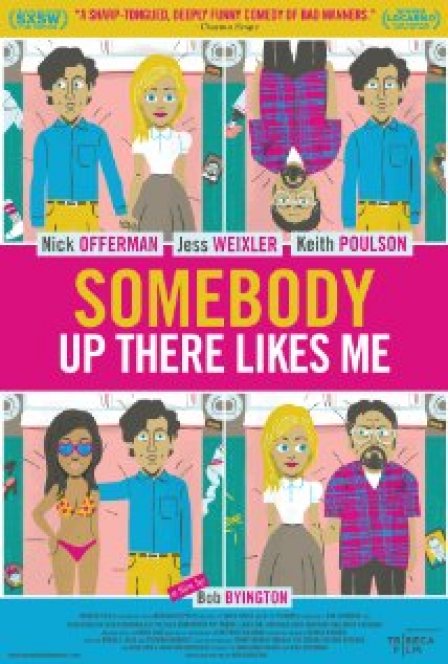We have been running into a lot of detestable young men on screen lately. Men who don’t deserve empathy or sympathy; men who have undiagnosed personality disorders and are openly spiteful and often remorseless. Our fallback is to call this a generational issue and to pin any character demonstrating these traits with a title pulled from the books of Apatow: the inveterate man-child (a term that sounds awkward when pluralized, incidentally). But there is more substance in this archetype than indolence and narcissism. To call their personalities flawed would be an understatement. Some of these perpetual adolescents have real social deficits, and this isn’t a breed that just emerged in the past ten years. These are sad, sad people, and we are free to laugh at them.
Bob Byington has broadened his scope since 2009’s underseen and underappreciated Harmony and Me (TMT Review). With the extremely deadpan Somebody Up There Likes Me, the Austin-based director stretches the currently-popular notion of arrested development as far as it can go, spanning a lifetime and intertwining the lives of two infantile men and the woman who tolerates them. Max Youngman (Keith Poulson) and Sal (Nick Offerman) are waiters at a high-end chop house — though they make it clear they’re not interested in customer service — and they work with Lyla (Jess Wexler), a reticent girl with a breadstick obsession. After a streak of fateful events, Max takes flippant advice from a guy at his father’s funeral (Kevin Corrigan, in a very brief cameo) and decides to marry the next woman willing to accept him. The gist of Corrigan’s suggestion is that it doesn’t matter who you marry, because you’re going to be miserable with anyone. So Max impulsively marries Lyla, and the story follows their relationship for the next 35 years. While still a young couple, they get a windfall of inheritance and Max lets Sal move in and leech off their fortune, thus beginning their sordid and tragic journey together.
Max, Sal, and Lyla are stuck between having an idyllic life and being eternally depressed. They have immense wealth (for a while) and are mired in ennui. Even as time moves forward, skipping in five-year fragments, they stay young, tainted by the fountain of youth rather than blessed by it. Max appears to be fully medicated, flattened by Xanax and Zoloft, unhappy and complacent regardless of where he is in his flash of existence. Abetting this despondency is his only friend, who is so self-loathing and contemptible that we almost feel sorry for him. You may wonder how anyone could put up with a person like Sal for their entire life, but they complement each other very well. Lyla is there in the middle, reasonably sane and the one they both love and don’t respect, yet she also comes across as mildly disabled or cognitively impaired. Is their misfortune amidst great fortune funny at all? Of course it is. In a strange way, it’s like watching a bizarre incarnation of the Kardashian clan, with their darkest emotions revealed to the world, their shallowness becoming all-consuming.
For those expecting to see Ron Swanson in long form, you’re going to get a much bleaker version, the antithesis of a Renaissance man. Offerman commits to the nihilistic side of his character, with only glimpses of Sal’s compassion. He’s still worth the price of admission, but this is Max’s story, and Poulson has to carry the weight, which he does. Somebody isn’t just a character piece though: it’s also an inquiry into the slow march towards death, and Byington intersperses whimsical animation (by Bob Sabiston of Waking Life and A Scanner Darkly) to playfully accentuate the passage of time.
Buoyed by a breezy score from Vampire Weekend’s Chris Baio and Megan Mullaly in a minor role as an apathetic therapist, Somebody Up There Likes Me is a deceptively rich film. If you appreciate muted jokes and melancholia, you will be in good company. I, for one, am looking forward to pressing play again.

